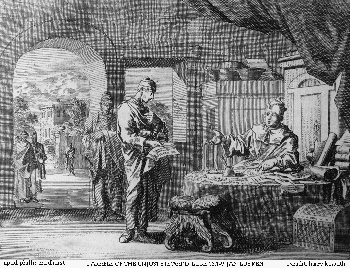For Sunday September 22, 2019
Lectionary Readings (Revised Common Lectionary, Year C)
Amos 8:4-7
Psalm 113
1 Timothy 2:1-7
Luke 16:1-13
I think I can safely say that no parable of Jesus’s baffles me as thoroughly as the parable of the "shrewd" or "dishonest" manager. I’ve wrestled with it for a week now, and still have no idea what to make of it. Apparently I’m not alone; people have struggled to make sense of this particular story from Luke's Gospel for centuries, not least because it raises the oddest and thorniest of questions: why does the rich man commend his manager for dishonesty? Why does Jesus offer his followers such an unsavory character as a role model? In what sense are the “children of light” supposed to take a cue from the “shrewdness” of a self-interested scoundrel? Why is the parable followed by so many convoluted platitudes and glosses? Are we missing something, or does this story in fact contradict everything Jesus stands for in the rest of the Gospels?
I wish I had definitive answers to these questions, but I don’t. What follows are possibilities. "Notes." Limited and provisional guesses. I’m not wholly satisfied with any of them, but maybe that’s the ultimate point of Jesus’s parables — to enter in and keep wrestling.
On earth as it is: In the story he tells, Jesus describes a manager who is about to be fired for “squandering” his employer’s property. Knowing that his time is short and his future prospects of employment limited, the manager summons his boss’s debtors, reduces their debts, and thus secures their goodwill and loyalty. When his boss finds out what the manager has done, he doesn’t get angry. He commends the manager for acting shrewdly to save his own skin.
Translation: Jesus describes a world we know only too well. A world in which dishonesty, corruption, self-interest, and ill-gotten wealth rule the day. A world in which selfish ambition often secures praise and prosperity, while honesty garners cynicism and contempt. A world in which the heavy burden of debt cripples people both financially and morally. A world in which unfairness, exploitation, and privilege are so systemic, we barely notice — much less protest. A world in which ethical living is neither straightforward nor easy.
 |
Maybe the parable of the shrewd manager is simply a grim but truthful portait of the world as it is — the real world in which we are called to be “children of light.” Maybe the story is an acknowledgment that the calling is both radically countercultural and painfully hard. Maybe the story is Jesus leaning in towards us and saying, “I know. It’s bad out there. It’s bad in here! I get it.”
The truth is, we as Christians live in a world that is profoundly interconnected — and profoundly compromised. Even the tiniest financial decisions we make — where to shop, how to invest our money, what to eat or wear in an age of corporate greed, child labor, climate change, and globalization — have far-reaching consequences. Jesus’s parable reminds us to hold this complicated reality close to our hearts and our consciences all the time. To not do so is to succumb to the darkness.
Don’t just sit there — do something! When the manager realizes that he’s in trouble, he springs into action. He doesn’t wait around, he doesn’t despair — he hotfoots it out the door, a plan at the ready. Perhaps it’s this sense of urgency, of single-mindedness, of creative possibility and cleverness that wins the manager such high praise from his employer. The manager harbors no illusions; he knows himself well. He knows he’s “not strong enough to dig,” and he knows he’s “too ashamed to beg,” so he focuses instead on redeeming what he can about the situation he finds himself in. In other words, there’s something no-nonsense, something steely and utterly practical about his choices.
Jesus puts it this way: “The children of this age are more shrewd in dealing with their own generation than are the children of light.” I wonder if this means we can do a better job of engaging the crises, issues, injustices, losses, and failures facing our generation, facing our Church, facing our world, here and now. In what ways are we failing to meet the challenges of our time and place head on? Where in our individual and collective lives are we waiting around instead of hitting the streets, the pews, the hearts, the nations? In what areas of contemporary life have we lost cultural relevance as Christians? Where and how might we be more shrewd, more clever, more creative, and more single-minded in our vocations as children of light? If the manager in Jesus’s story can hustle so hard for his own survival, how much more might we contend on behalf of a world God loves?
 |
Forgive, forgive, forgive: This might be a stretch, but what if the parable of the dishonest manager is a parable about forgiveness? Radical, full-on, over-the-top forgiveness? The story begins with the rich man accusing the manager of “squandering” his property. What if what the boss considers “squandering” is actually generous living? What if the manager’s mismanagement is actually the fruit of his compassion? How would the story read differently if we assumed that the manager spent years risking his job and his employer’s displeasure to ease the financial struggles of the workers he managed? True, his methods as described in the parable are dishonest; Jesus makes that abundantly clear. But what if even in his imperfection, the manager embodies grace and forgiveness? This would be of a piece with his last and drastic move in the story: even on his way out, he lessens the debts of those who can’t pay off what they owe. He does so at the risk of further angering the boss he has already offended.
One of the many interpretative glosses that ends the Gospel reading this week is a famous line from Jesus: “You cannot serve God and wealth.” If we choose to read the parable as a story of forgiveness, then even the rich boss's narrative arc ends in grace: when he’s faced with the reckless generosity of his manager, he chooses to commend that generosity — even though the manager has lost him money. If the rich man loved and served his wealth over everything else, he wouldn’t find it in his heart to extend forgiveness and approval to his manager.
 |
I don't think it's possible to draw neat correlations in this parable. The rich man is not straightforwardly God, and the manager is not straightforwardly us. But perhaps the story offers us glimpses of the divine. Where there is forgiveness, there is God. Where there is unburdening, where there is liberation, where there is crazy, radical generosity — there is God. And where God is? Well, that's where we should seek to be as well.
As I wrote at the start of the essay, these “notes” are just possibilities. My attempts to wrap my head around a story that bewilders me. If nothing else, the parable of the dishonest manager reminds me to tread lightly when it comes to the words and stories of Jesus. To approach with humility, to hold a place for mystery, and to refrain from closing down interpretations too soon. As is ever the case with Jesus, we are dealing with an overabundance of meanings, truths, and possibilities — not a lack. But the calling, still, is to live as children of light in a world that sorely needs solace, grace, forgiveness, and freedom. I pray that we will enter into that calling with our whole hearts and minds — creatively, urgently, shrewdly — while we still can.
Debie Thomas: debie.thomas1@gmail.com
Image credits: (1) life.remixed; (2) Trusting or Tripping; and (3) Wikipedia.org.





